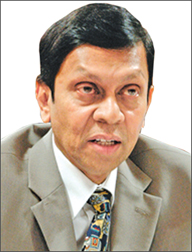Lanka hails return of diaspora cash
Sri Lanka expects more capital inflow as the country's diaspora
returns to invest after the end of a 30-year civil war, Central Bank
Governor Ajith Nivard Cabraal said on Friday.
|

Central Bank Governor Ajith Nivard Cabraal |
"With political stability will come investment," Governor Cabraal
told Reuters.
"There will be investment that will come with tourism and
infrastructure, but also there will be reinvestment by Sri Lankans
themselves. That could be an important area for growth because the
investment coming back could be the anchor for growth for next year and
beyond."
Sri Lanka's war ended last May, and with it came an overflow of money
from those wanting a piece of the current economic revival.
Sri Lanka's stock market has returned more than 172 percent since it
hit a trough at the end of 2008, spurred by the end of the conflict and
a $2.6 billion International Monetary Fund loan that helped lift the
country's sovereign debt ratings.
Government debt prices and the rupee have also rallied on the IMF
cash injection and the end of the war.
Sri Lanka's economic expansion is likely to be more than the
government's 6.5 percent forecast this year, owing to rapid growth in
infrastructure development and tourism.
"Estimates are likely to be revised to closer to seven (percent) or
even beyond seven (percent)," Cabraal said.
Sri Lanka has been able to slow its inflation rate to 6.3 percent in
March from a one-year high of 6.9 percent a month ago, Cabraal said.
"Sri Lanka has been a high inflation country for a long time. We have
been able to bring inflation down to very reasonable numbers within the
last year, and we are conscious that we have to maintain that," he said.
"This gives a signal that we mean business as far as inflation is
concerned, and we see the market reacting to that."
Cabraal also said the next time the Government sells a Eurobond it
will likely be a 10-year tenor, in order to improve its yield curve. But
at the same time, Colombo is encouraging the private sector to sell
their own bonds.
"There are several companies that are just going beyond the $1
billion-mark, and there are other companies close to that," he said.
"As Sri Lanka grows, there are many corporates that are possible
contenders for global capital. It will be a good opportunity for foreign
investors to invest in Sri Lanka."
Any risk that the South Asian island may face, Cabraal said, would be
external. "If there is a slow take-off of the world economies,
particularly in Europe, it can have an impact on Sri Lanka." |

